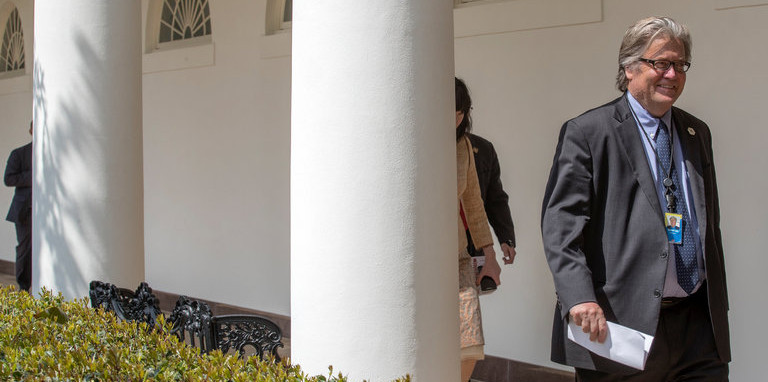Pentagon and National Security Advisor win battle for control of foreign and military policy, as chief strategist Steve Bannon is removed from key committee
Developments on Day 76 of the Trump Administration:
Nat’l Security Establishment Removes Bannon from Key Position
Trying to take back control of US foreign and military policy, the national security establishment forces the removal of White House chief strategist Steve Bannon from the National Security Council’s Principals Committee.
News of Bannon’s dismissal from the Committee, which handles implementation of the NSC’s guidelines, came suddenly on Wednesday — ironically, probably from a source close to the strategist, the hardline ideologue who previously edited Breitbart News.
That “senior Administration official” told several outlets that Bannon was not demoted but had completed the task of removing politics from the NSC, keeping a close eye on National Security Advisor Michael Flynn. After Flynn’s dismissal in February — over his conversations with the Russian Ambassador to the US — Bannon’s presence was no longer necessary, according to the official.
That story immediately raised questions, given that Flynn was an ally of Bannon within the White House. The strategist subsequently issued his own statement, declaring that he had “de-operationalized” the NSC after it had been “operationalized” in the Obama Adminsitration.
This political spin was soon followed by a more plausible account: National Security Advisor H.R. McMaster — supported by the Pentagon and Defense Secretary James Mattis, another former high-ranking general — had pressed for the removal of Bannon for elevating political considerations over foreign policy and security issues in the NSC.
McMaster not only removed Bannon. He also reversed other elements of an executive order, drafted by the chief strategist and his allies, issued within days of Donald Trump’s inauguration. The top American military official, the chairman of the Joint Chiefs of Staff, and the Director of National Intelligence were restored to the Principals Committee. The head of the Energy Department — responsible for nuclear matters — the CIA Director, and UN Ambassador were also added.
In a further sign of imposition of his authority, McMaster has reportedly sought a face-saving removal of K.T. McFarland, a Bannon ally who is Deputy National Security Advisor. Rather than being dismissed, she has been offered an Ambassadorship or a position in the State Department.
Yesterday’s news was the culmination of an eight-week battle over Bannon’s influence on the NSC. When Michael Flynn was dismissed as National Security Advisor in mid-February, the first choice to replace him, retired Admiral Bob Harward, insisted on the NSC’s autonomy and his authority to choose and dismiss staff. Donald Trump refused, and Harward turned down the job.
McMaster accepted the position the following week, with sources close to him saying he would not accept the limits imposed by the White House. However, the general still struggled to take control, with his efforts to dismiss McFarland rebuffed.
The shift this week appears to have come after McMaster and the Pentagon won the support of Trump’s son-in-law and senior advisor Jared Kushner. Increasingly used as Trump’s foreign policy envoy at large — from meetings with Foreign Ministers to oversight of the Israel-Palestine issue to this week’s trip to Iraq — Kushner had reportedly become convinced that Bannon’s hardline politics were damaging the NSC.
The decision may also have been accelerated by the confluence of foreign policy challenges for the Administration. The Pentagon has always been concerned about Trump’s aversion to a commitment to NATO and his embrace of Russia’s Vladimir Putin. Recently the military has sought — and obtained — more freedom of action in Middle Eastern and African theatres such as Syria, Iraq, Yemen, and Somalia.
Meanwhile, tension over North Korea’s nuclear weapons program has escalated over Pyongyang’s missile tests. Tuesday’s chemical attack by Syria’s Assad regime — only days after the White House had embraced Assad’s continued stay in power — gave the Pentagon and the NSC the opportunity to argue for a return to a tougher line.
See Syria Daily, April 6: Will Trump Administration Act Over Assad’s Chemical Attack?
Steve Bannon at the White House on Monday (Stephen Crowley/New York Times)

